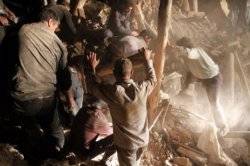Casualties from a pair of earthquakes that devastated rural villages in northwest Iran on the weekend have risen to a total of 306 people, most of them women and children, and injured 3,037, Health Minister Marzieh Vahid Dastjerdi said.
The official toll, presented in a report to politicians on Monday and published on the parliament's website, was a big jump over the last count given on Sunday by Interior Minister Moustafa Mohammad-Najjar, who spoke of 227 dead and 1,380 injured.
Vahid Dastjerdi said that, of the 306 deaths, hospital morgues counted 219 women and children and 49 men. The discrepancy with the total appeared to come from the fact that some of those killed were buried by their families before officials arrived at the scene.
She also said that, of the 3,037 injured, most were given first aid at the scene, while the others were taken to hospitals for treatment. Some 700 surgeries were performed, she said.
Vahid Dastjerdi said that "we are continuing the search for bodies"
Another official, Hassan Ghadami, a deputy interior minister in charge of crisis management, told the meeting of lawmakers, "Many of the victims were killed in the first hours [after the quake] due to the mass of muddy rubble ... and the old structure of houses in the region."
Two earthquakes measuring 6.4 and 6.3 on the moment magnitude scale rumbled through northwest Iran on Saturday, leveling mud brick and concrete homes in villages to the northeast of the city of Tabriz.
Sufficient resources
Iran's government has launched a fund to quickly rebuild homes in the mountainous region before the onset of the harsh winter in around four months, as it announced two days of mourning.
The head of Iran's Red Crescent, Abdolhossein Faghih, told the same hearing that 230 villages had been badly damaged, including a number totally destroyed. A state grant of nearly $1,000 per family has been approved, along with low-interest loans for up to $6,000.
Faghih said the Red Crescent has provided relief in the meantime for the more than 16,000 people left homeless, distributing thousands of tents and blankets, and food and water.
Iran rejected offers of outside help in the wake of the quakes from a number of countries, including the United States, Germany, Turkey, Taiwan, Singapore and Russia. It said it could cope with the disaster itself.
"We received offers of help from several countries ... but as we have sufficient men and resources we did not need this foreign aid. We thanked them for their offers," Faghih said.
Meanwhile, several Iranian blogs and news sites have criticized Iran's President Mahmoud Ahmadinejad for not visiting the affected areas and leaving the country for a meeting of the Organization of Islamic Cooperation in Saudi Arabia without issuing a statement of condolence or support to the survivors of Saturday's earthquakes.
Authorities called off rescue operations on Sunday after saying all possible survivors had been recovered.
Iran sits astride several major fault lines and is prone to frequent earthquakes, some of which have been devastating.
PHOTO CAPTION
Iranian rescue workers search for survivors in the rubble of a house in a village, near the town of Varzaghan, 60km from Tabriz.
Aljazeera


 Home
Home Discover Islam
Discover Islam Quran Recitations
Quran Recitations Lectures
Lectures
 Fatwa
Fatwa Articles
Articles Fiqh
Fiqh E-Books
E-Books Boys & Girls
Boys & Girls  Hajj Rulings
Hajj Rulings Hajj Fatwas
Hajj Fatwas














